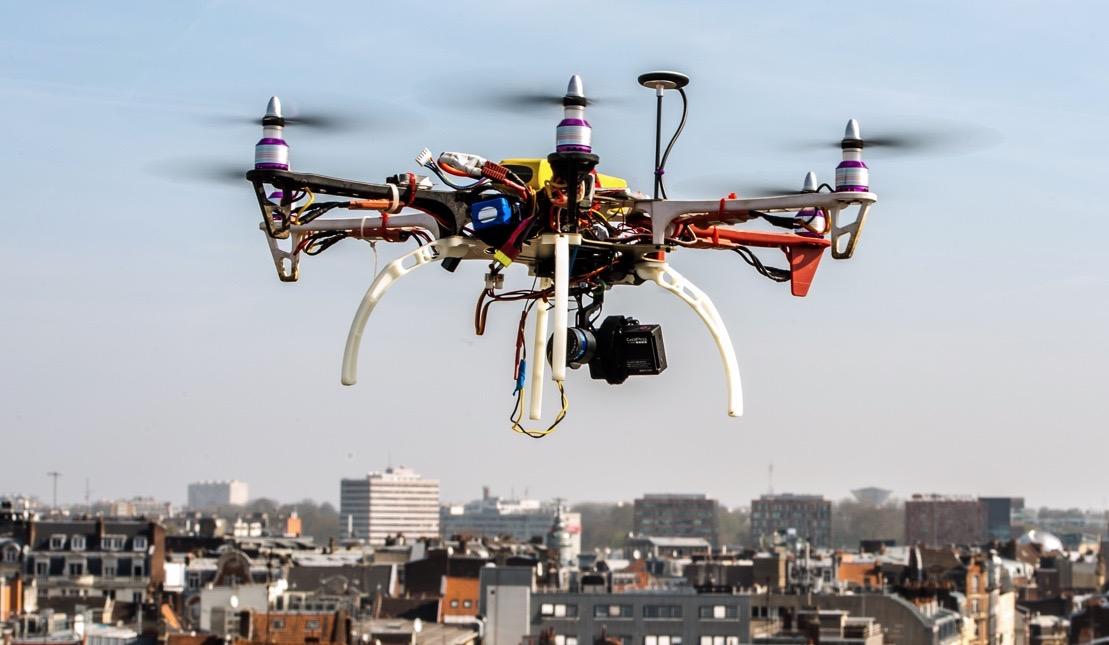In the drone race, Europe is killin’ it
A drone is pictured in flight in Lille, northern France, on April 10, 2015.
LISBON, Portugal — While the United States grapples with the effectiveness and morality of military drone strikes, Europe is seeking to reap the benefits of bringing the remotely piloted aircraft into civilian life.
Authorities on this side of the Atlantic are hoping to harness drone technology to help farmers mind their flocks, engineers maintain pipelines and power cables, and delivery services send parcels faster and cheaper.
"Europe needs to be ambitious and embrace drones as an essential part of the future of flying," says Violeta Bulc, the European Union's transport commissioner.
"Drones are already flying, and the market is pushing for more," she told a recent aviation conference. "We need to create the right environment for them to flourish."
Europe's market is now governed by a patchwork of national regulations.
Spain last year banned commercial drone flights despite an outcry from its tech and film industries. France, Italy and others take a more liberal approach. Now, the EU is working to introduce common rules that would address privacy and safety issues, while allowing commercial drones to operate around the 28-nation bloc.
In March, national governments, civil aviation agencies and industry representatives met in Riga, Latvia, to map the way ahead. They agreed to draw up regulations by December "to allow businesses to provide drone services everywhere in Europe as from 2016."
Industry experts say that could leave the US civilian drone industry trailing in Europe's wake.
The drone industry in the United States says it loses around $27 million a day due to rules that effectively ban commercial flights by unmanned aircraft systems (unless they get special authorization from the Federal Aviation Authority).
"If European regulators have their way, drone operations in the EU are going to become very permissive, far outpacing American regulations," Gregory S. McNeal, a drone expert at California's Pepperdine University, wrote in a regular blog for Forbes magazine.
As it struggles to inject new life into an economy struggling to recover from the euro zone debt crisis, Europe sees clear advantages in drone investments.
The EU estimates civil unmanned flight could generate $17 billion a year by 2020, and the aerospace industry says building and operating drones will create 150,000 jobs in Europe by 2050.
Some aren't waiting that long. In Italy alone, 85 schools have been authorized to teach drone piloting in the past year, according to the country's civil aviation agency.
France, which became one of the first countries to regularize commercial drone flights in 2012, now has more than 1,200 operators.
Bordeaux wine producers operate drones to monitor the quality of grapes and rapidly detect signs of disease on the vines.
French energy giant GDF-Suez has started to use surveillance drones to check for potentially damaging construction work close to its network of almost 20,000 miles of underground pipeline.
During recent floods in southern France, local authorities hired commercial drones to monitor water levels, assess damage and prioritize response operations.
Companies like Amazon, Google and DHL are preparing to start commercial services using remotely piloted planes, but Europeans are likely to get their goodies dropped in the backyard by miniature helicopters before Americans.
Amazon said that American legislation prevents it from even test-flying its delivery drones in the United States. So it shifted its experimental work to Canada.
Meanwhile, DHL was able to launch a groundbreaking regular drone delivery service in Germany last autumn, taking medical supplies eight miles from the mainland to the remote North Sea island of Juist using a yellow-painted four-rotor “parcelcopter.”
Europe hopes its incoming legislation will encourage more such initiatives to keep it at the forefront of a fast expanding market, even as officials insist new EU-wide standards will take full account of the privacy, safety and security questions.
The European Aviation Safety Agency has put forward a “concept of operations for drones” that could form the basis of the legislation due to be adopted by the end of this year.
It proposes placing drones in three categories, ranging from the most simple that require no specific authorization — provided they are not flown in risky areas, such as over crowds or near airports — to more complex drones requiring a risk assessment and government clearance, and a highest category that would be treated like traditional manned aircraft.
“We have quite an open approach,” Ilias Maragakis, an EASA spokesman, said from the agency's headquarters in Cologne, Germany.
“Our priority is not just to develop regulations, but to make sure the regulations do not strangle this new and upcoming industry," he told GlobalPost. “Always keeping safety in mind, but creating a fertile field for this industry to grow.”
Civilian deaths from US drone strikes in Yemen, Pakistan and Afghanistan, and recent terrorist fears after mysterious drones appeared over sensitive sites in Paris have given unmanned planes a sinister reputation. The European industry however is stressing the aircraft's good-guy applications.
Relief organizations have been using drones to survey damage and search for survivors in the wake of the Nepal earthquake — although the government announced restrictions Wednesday over fears they were revealing sensitive information.
A Malta-based humanitarian group says its two drones have helped locate and rescue thousands of migrants seeking to cross the Mediterranean Sea into Europe.
Researchers in Belgium and the Netherlands are testing "ambulance drones" to fly defibrillators to cardiac arrest victims, saying their speedy arrival could increase survival rates by 10.
And conservationists are using drone-borne cameras to catch poachers preying on rhinos and elephants in African game parks.
We want to hear your feedback so we can keep improving our website, theworld.org. Please fill out this quick survey and let us know your thoughts (your answers will be anonymous). Thanks for your time!
